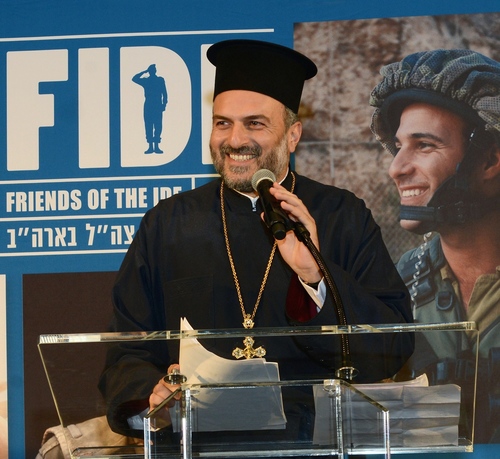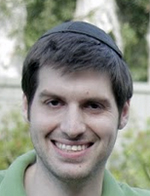
By Jacob Kamaras/JNS.org

HOUSTON, Texas–“It’s nice that he understands both English and Hebrew,” Father Gabriel Naddaf tells his interpreter, Amit Barak, at Houston’s Royal Sonesta hotel while I go back and forth between the two languages during my interview with the Israeli Greek Orthodox priest.
Hebrew is Naddaf’s stronger tongue, and English is mine—despite my 12 years of Hebrew-language classes in American Jewish day school. But despite having his interpreter at my disposal, something about Naddaf’s simultaneously commanding and soothing presence encourages me to not only ask him some questions in my choppy Hebrew, but to also try my best to comprehend his Hebrew responses rather than relying on Barak’s translations.
But why does the language issue matter? Naddaf, who visited Houston to address the Friends of the Israel Defense Forces (FIDF) Texas Region gala on March 28, is best known for his efforts to bolster Arab Christians’ integration into Israeli society through their voluntary enlistment in the Israel Defense Forces (IDF). For Israeli Jews, by contrast, national service through the IDF or other avenues is mandatory. Naddaf’s pro-IDF stance is often accosted by Israeli Arabs and Palestinians, so much so that the pastor’s son was physically assaulted for that reason in December 2013. Yet Father Naddaf has pushed on with his IDF recruitment efforts, and upon meeting him in person, it’s clear that he exudes Israeli pride. What language other than Hebrew, then, would have been appropriate for this interview?
When Naddaf co-founded the Israeli Christians Recruitment Forum in 2012, the average number of Arab Christians enlisting in the IDF was 35 per year. That number skyrocketed to 150 in 2013 and continues to increase annually, albeit at a slower pace year to year, Naddaf says.
“It’s still not that a high a number, but the numbers are rising slowly every year,” he says. “You have to understand that there is a lot of pressure against [IDF enlistment] inside of Arab society, from Muslims and also from Christians who were taught for years that they should stand with the Muslims, with the Arabs, and not with the State of Israel. It’s a long process, but it’s changing. More and more Christians are joining this historic movement. I tell the Christians, ‘At this time, you see what is happening in the Middle East. It is very important to stand with the State of Israel.’ This is the Christians’ home. The Christians should defend, along with the Jews and with the Druze and with the Bedouin, the State of Israel and the Holy Land. Their roots are from the Holy Land, so they have to be on [Israel’s] side.”
FIDF’s Houston gala—during which Naddaf turned the tables from our interview by addressing the crowd in English—raised more than $500,000 to support the wellbeing of Israeli soldiers. Naddaf’s FIDF-organized United States trip also included a stop in New York City.
“I’m coming [to America] and I’m meeting my brothers,” Naddaf tells me. “My Jewish brothers and also the Christians, the real believers, who believe in both the Hebrew Bible and the New Testament and follow the right path. So both of them, the Jews and the Christians, they are my brothers and I hope that I will keep meeting my brothers.”
Scott Kammerman, the executive director of FIDF’s Texas Chapter, says he first met Naddaf—and was inspired to bring him to Houston—at a Christians United for Israel (CUFI) “Night to Honor Israel” program.
“I noticed this Greek Orthodox priest was getting up there, and when [CUFI founder] Pastor [John] Hagee was explaining [Naddaf’s] mission, how he encourages Arabic-speaking Christians to join the IDF, the entire congregation of Pentecostals and evangelicals—completely different Christian denominations—stood up and applauded,” Kammerman tells JNS.org. “I thought to myself, ‘This is so important.’ His mission, and not just his mission, but the mission of all pro-Israel Christians…as Jews, we need to embrace and thank those Christians who are standing side by side with us, yad b’yad (hand in hand).”
Naddaf describes the current state of global terrorism as a case of history repeating itself through a new cast of characters.
“Today’s terror has a cultural and religious background…it’s not a political conflict,” he tells me. “It’s a religious conflict. For religion, people do believe that it’s worth it for them to die because they’ll receive good things in the world to come…and it’s not just me saying this. The killers are also saying this, that they’re going to kill ‘non-believers,’ so they’re talking about religion and culture.”
Despite the ongoing internal terrorism and regional terror threats Israel faces, the Jewish state is witnessing the parallel development of increasingly positive relations with Arab neighbors like Egypt, which in January stationed an ambassador in Israel for the first time in three years and shares Israel’s goal of defeating Islamist terrorism in Gaza as well as the Sinai Peninsula. What does an Israeli-Arab Christian leader like Naddaf think about Israel’s ties with Arab states?
“It’s very important for Israel to have relationships with strong Arab leaders, like [Egyptian President Abdel Fattah] El-Sisi, who is behaving much better towards the Christians [than his predecessor, the Muslim Brotherhood’s Mohammed Morsi],” Naddaf says. “I am also hearing voices from other leaders in the Middle East who are looking to have better relations with Israel. It’s positive and important, but we have to understand that in the Middle East, there are always ups and downs—including downs when the extremists are taking the lead, like what’s happened with Iran. But every time there is a good leader and a strong leader that looks to cooperate with Israel, it’s very good. It’s also easier if those [Arab] states will become more democratic.”
Given the Islamic State terror group’s conquering of large swaths of Iraq and Syria, I ask Naddaf what he thinks Israel can do to help persecuted Mideast Christians. He responds that Israel “can help keep and save Christians in the Middle East in their own home and place.”
“It’s not good to take people out of their homes because of any situation,” he says. “[Christians] should stay in their homeland, and that’s where Israel can help. A Middle East without Christians will be less stable. Without Israel, Christianity around the world would be nothing, because the Christians in the Middle East and Israel are the source of Christianity. Israel and the Middle East, it is where Christianity began. If there are no Christians in the Middle East, then what’s the significance, for example, of Christians in China? It is like if there would be Jews in Germany and France, but not in Israel. Something would be missing.”
*
Kamaras is editor in chief of JNS. Comments intended for publication in the space below must be accompanied by the letter writer’s first and last name and by his/her city and state of residence (city and country for those outside the United States.)